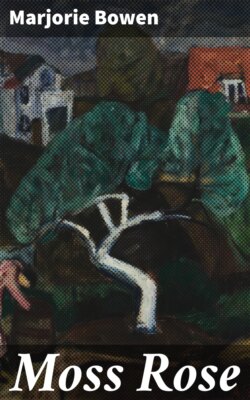Читать книгу Moss Rose - Bowen Marjorie - Страница 17
На сайте Литреса книга снята с продажи.
* * *
ОглавлениеTable of Contents
Belle's fire was sinking out; she wanted more coal; it would soon be dark and she had neither lamp nor candle. It was all very well in the daytime, with the bright flames in the narrow grate, the house full of people, and something to do to occupy oneself. But, at night, surely no one would expect her to spend the night on that empty floor with Daisy Arrow's unoccupied room the other side of her thin wall. She would have to take another room downstairs, though it was odious to think of sleeping with one of those women. They might even let her leave the house if she had had anywhere to go. She seemed to have soon satisfied the police, although she was the person who had been nearest to the scene of the murder, that the criminal at his work, or the victim waking for the last time, might have heard her as she restlessly tossed on her creaking iron bed.
Her evidence had been soon given. She had been a witness to Daisy Arrow's three visits to the kitchen; she had seen her on the top of the stairs when she, herself, had gone to bed; she had returned to her the feather that she had borrowed to wear at the Argyll Rooms. She had herself been tired, for not only had she played in the evening performance at the Cambridge, but she had been rehearsing all day, trial dances and scenes in the hope of obtaining some work in the pantomime "Puss in Boots," opening to-morrow, and in which, at the last minute, changes had been made. Therefore, she had gone to bed and was asleep at once; her candle confirmed that; it had not been above three inches when Mrs. Bulke had given it to her, and not one inch was burnt down.
And so, she had slept heavily; just waking once or twice—hearing the bells of Christmas morning—seeing the foggy London light in the room—and in her idleness and fatigue, going to sleep again till, finally, she had been roused by Florrie's unrestrained shrieks on the staircase.
The police did not seem in the least to doubt her story and questioned her hardly at all. A search of her room had proved fruitless and what she had said sounded so reasonable.
She was asked if she had heard the front door slam about half-past six?
The pale girl—who so far had been nameless, but who now, it seemed, was called Lily Mason—had said with many convulsive sobs and tears that she had been roused about half-past six—she thought it was—by the front door slamming; and Mrs. Bulke, also, admitted to hearing this noise, but had agreed that it was not an infrequent occurrence at No. 12—the front door closing noisily in the middle of the night or the early hours of the morning. Therefore, she had taken no notice.
Belle said quietly, No, she had not heard that, and she too had admitted that doors often slammed either in that house or up the street, and that she also, living in Great Hogarth Street, had become accustomed to such disturbances.
So far—so safe.
There had only remained the question of the knife, and she felt that she had better face that. She was sure that they would be able to trace it, so she had told, as casually as she was able, of Daisy Arrow's visit to the Cambridge (which could, of course, have been ascertained from other sources), of her interview with her in the dressing-room under the stage, and of her taking up the clasp-knife which old Bobs, the stage hand, had brought in for her to use with her food (the cook-shop having forgotten to send a knife over) and of Daisy Arrow putting it in her reticule, under the excuse that she was going to have supper in her room and wanted a knife with which to cut sandwiches and fruit.
Belle thought, even as she told it, that this story sounded weak and unlikely. She wished she had thought of the point before, then she might have been able to invent something more convincing. It was difficult to think of a good excuse for Daisy Arrow taking that ugly stained knife away from the Cambridge in her silly beaded bag.
Belle had thought rapidly: "If I tell them the truth, first, they won't believe me, and if they did, they would consider that a woman who was in the condition to be seriously contemplating suicide-and such an ugly form of suicide—was an object of suspicion. It would be very foolish of me to admit that I associated that knife with a woman's throat being cut. They might think that Daisy and I had quarrelled."
But no such suspicion seemed to enter Superintendent Matchwell's mind. He accepted Belle Adair's story—corroborated the details of it from Mr. Figg of the Cambridge Theatre—from Minnie Palmer—from the other women of No. 12—and he even obtained, to Bell's surprise, evidence in support of her invented tale of the knife-borrowing, for he elicited from Mrs. Bulke that she did not like her ladies to bring in food and eat in their bedrooms and that she had frequently refused Daisy Arrow knives, forks and crockery to use in her bedroom. The rooms of No. 12 had been searched but nothing of interest found; it had been quite easy for Belle to hide the German Bible in the pocket under her skirt.
